Gazebos for summer cottages: original buildings, style and design
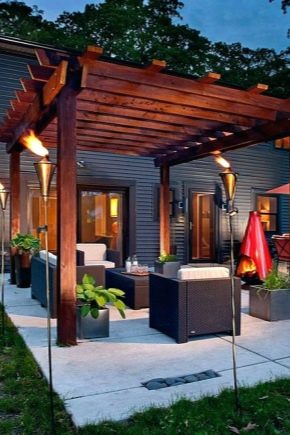
The design of a summer cottage area is a very important task, because today it is required not only to create comfort or to grow certain plants, but also to meet the high aesthetic standards of the 21st century. An attractive design solution in many cases is the construction of a gazebo in the country.
But you need to approach it with all accuracy and very thoroughly, taking into account the maximum subtleties and nuances.
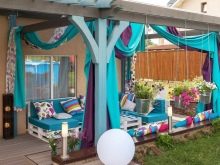
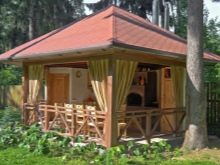
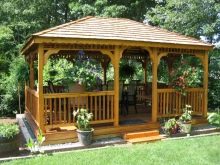
Peculiarities
As soon as warm spring days begin and until the end of autumn, many people try to find themselves in nature more often. And it is advisable not to sit in the garden house all the time, but to be in the fresh air. The summer house provides such an opportunity. It allows you to find the best compromise between comfort (minimal risk of overheating, getting wet in the rain) and the feeling of being close to nature.
Compared to simple verandas, gazebos for summer cottages are even better for a number of reasons:
- a combination of functionality and external grace;
- the ability to build a building after the completion of the construction of the house and without any inconvenience for the residents;
- the ability to sit in the gazebo even in the dark and, in general, whenever you like, without creating the slightest difficulty for other people;
- and it is also a chance to embody original architectural ideas in the shortest possible time.
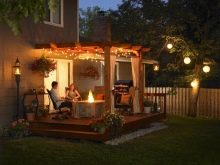
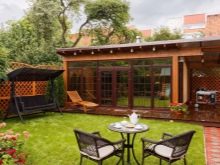
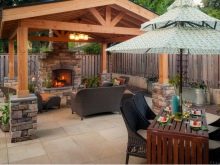
Types of structures
Country gazebos are divided into four types:
- open;
- closed;
- "Alive";
- for barbecue.
The vast majority of structures today are of the open type, which implies the use of columnar bases that hold the canopy. Despite the seemingly too simple appearance, hardly anyone can dispute the beauty of such solutions.
For decoration, decorative elements are necessarily used, partitions are always made between the pillars.
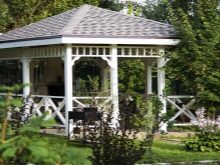
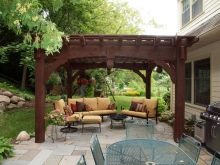
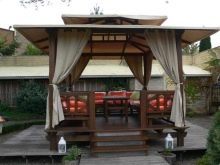
Open gazebos are the lightest and can be created with your own hands. They provide pretty decent protection from rainfall and summer sun. It should be noted that alienation from nature will be minimal: visitors will be able to enjoy the air, birdsong, etc.
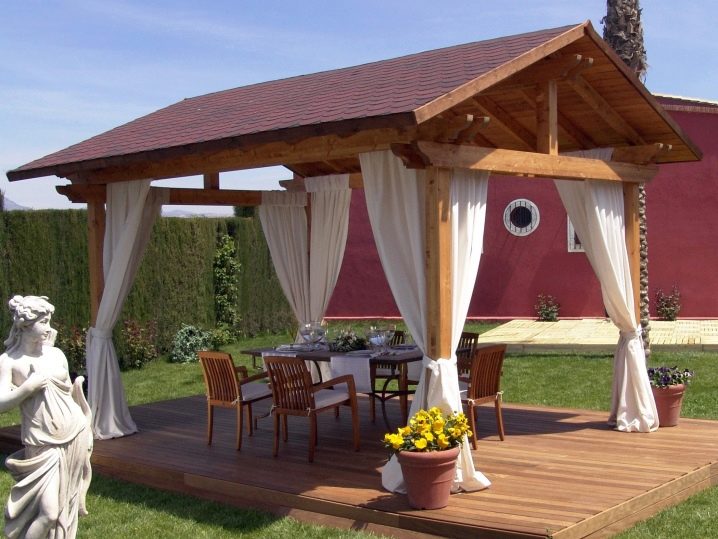
Along with this, an open gazebo will not protect against strong gusts of wind and is not suitable for the cold season. A big problem for almost all people will be the high risk of contact with insects: they can get inside without hindrance. Wishing to avoid such difficulties, it is worth choosing a closed gazebo, which is a small house or pavilion, covered on all sides by strong walls. Even on the coldest winter day, it is very easy and pleasant to sit in such a structure. Neither the wind, nor small animals or birds will be scary even to a small extent.
The problems with the closed type of gazebos are obvious - the space in them is limited, closed on all sides, it is impossible to feel the unique feeling of closeness to nature. In addition, you will not be able to cook barbecue or kebabs without installing a special chimney.
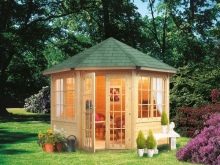
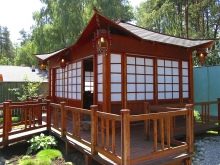
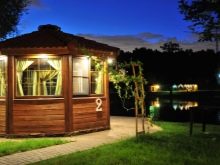
A hedge allows you to dispense with the use of familiar building materials or reduce their consumption to a minimum. Instead of such materials, plants are used, which radically improves environmental properties and makes the yard and garden cleaner. Lightness and grace, external sophistication and minimal cost allow you to prefer green gazebos to all other options.This solution allows you to enjoy the unique smells of natural herbs and shrubs.
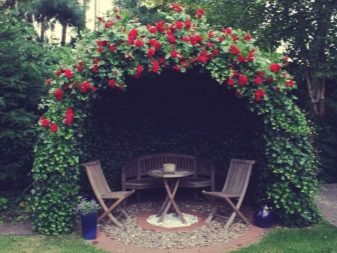
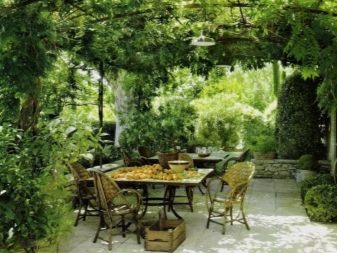
Another type is the BBQ gazebo, which is ideal for grilling meat dishes. A brazier is being built inside, in most cases such structures are made open in design, and only if there is a good chimney, you can create a closed gazebo.
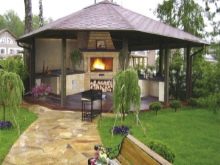
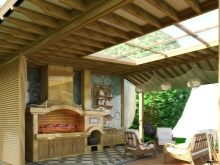
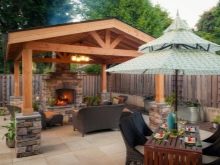
Materials (edit)
In the construction of gazebos, the following materials are most often used:
- In terms of environmental properties, natural wood is in the first place. It is especially good to use it when the same material is used to decorate the entire site as a whole. Wood is a universal solution, because it is easy and simple to process, it can take on a variety of external forms. But it is very important to saturate the tree with water-repellent mixtures, only then will it last a long time.
As a supplement to wood, you can safely use polycarbonate roofs, which increases the overall strength of the structure.
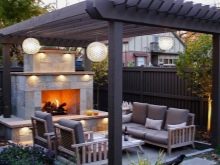
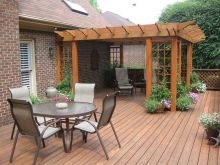
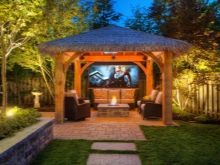
- Stone and brick gazebos can be equally open and closed. The first type requires the completion of insignificant partitions in height, complemented by pillars for awnings. Whether or not to leave free spaces is up to the owners of the sites themselves. When choosing a closed option, it is advisable to build capital walls, which can even be equipped with windows. Stone and brick are good because they allow you to equip the gazebo with a barbecue with a stand.
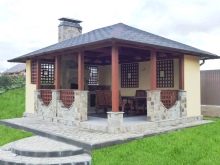
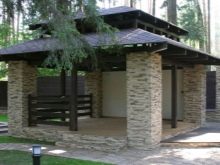
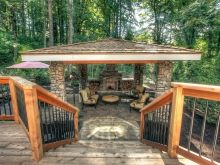
- Garden gazebos can also be made of metal. These are completely ready-to-use designs, sometimes with forging elements. In most cases, they try to make them light and give an intricate shape to avoid the negative effects of overheated metal.
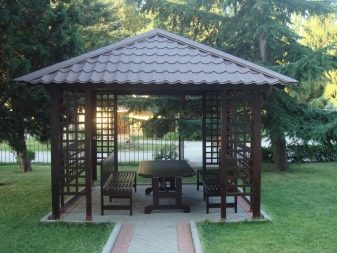
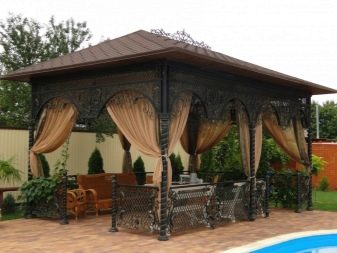
- Quite widespread are fabric products, mostly made of tarpaulin. This material does not absorb water at all; it rapidly flows down from the roof. Additionally, mosquito nets are used, which keep not only harmful insects, but also the ubiquitous dust.
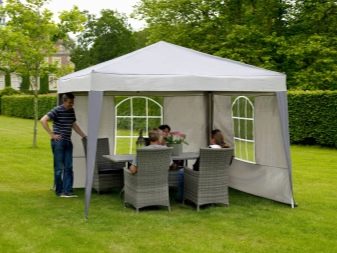
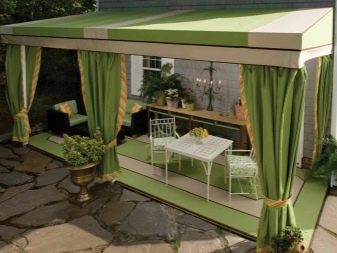
It is recommended to use the swing bench in the immediate vicinity of the fabric gazebos with a small canopy or simply upholstered with the same type of fabric. Both metal and textile solutions are collapsible in execution. The prefabricated gazebo is used mainly when the dacha itself serves only in the warm season of the year. For permanent residence outside the city, you need a more solid room, for example, frame gazebos made of natural wood.
Such designs can be made even by non-professionals who are poorly familiar with the canons of the art of building and a special method of work. A gazebo made of boards, logs, beams can be useful as a summer kitchen, as a space for settling guests and for a number of other tasks. Such a solution is economical and beautiful at the same time. It is irrational to create large-scale garden extensions and sophisticated architectural forms on a typical plot of 6 acres. However, it is quite possible to put a log gazebo, and using the unique features of the material itself, create an elegant, elegant atmosphere.
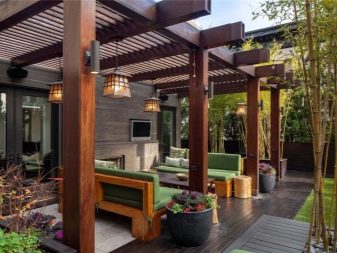
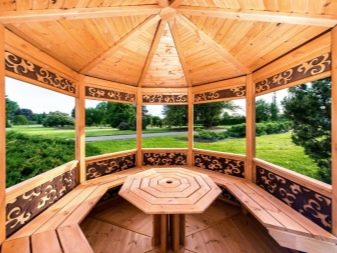
And you can put an open frame-type structure with a size of 300x400 cm from a bar, and the area limitation is only nominally. On it, it is quite possible to organize a summer kitchen, a fenced children's corner, and even a small work area. It is advisable to equip a frame gazebo with a roof so that precipitation and wind would cause less inconvenience to the residents of the dacha; it is also recommended to create terraces with railings.
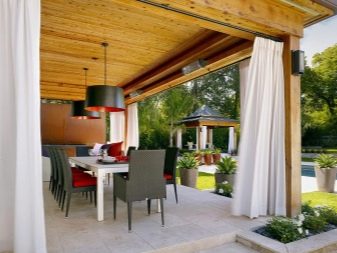
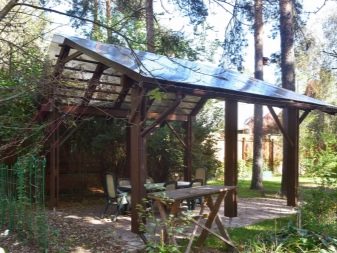
- Outdoor buildings made of plastic sometimes involve the use of PVC. This type of synthetic material creates different shapes quite easily, it can be dyed in any color you want. But you have to come to terms with the appearance of unpleasant odors under the influence of sunlight.Polypropylene is much cleaner in sanitary terms, but this material is too soft and is only suitable for dismantled elements of the gazebo.
Among all plastics, in the first place is polycarbonate, which not only has excellent structural characteristics, but also has an attractive appearance. Leaving an earthen floor is not very practical, it would be more correct to cover it with a boardwalk.
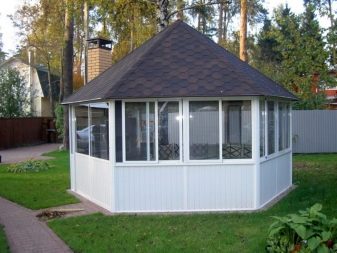
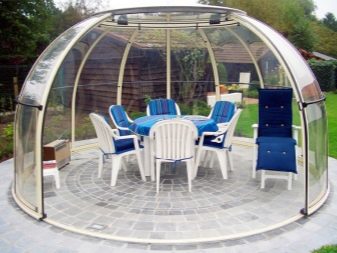
Useful Tips
- Regardless of whether a budget project is being implemented or not, when working on the frame of a wooden arbor, a 10x10 cm beam is used, and it is sheathed with boards with a section of 2.5 cm. Roofing material is often used as a roofing material, and a waste machine tool helps to save on special impregnations for wood butter; it dries more quickly when diluted with turpentine. Self-planed boards, even taking into account the cost of buying a woodworking machine, fully pay off (compared to choosing products processed at a factory). You can bring the workpieces into perfect shape in just a day.
- It is recommended to use sand concrete as the foundation of a wooden frame gazebo. For each block, its own pit and a sand cushion are created in it, since there is no point in forming a continuous underlying layer. How deep it is necessary to bury the foundation blocks and raise them above the ground is determined by focusing on the level of groundwater. It is better not to attach a wooden frame to the base, because this will make the structure stronger and allow you to raise the subsiding corners.
- Since the structure is light, there is no need for a strip foundation. If the summer cottage contains open hearths of any type, it is better to take stone and brick as a material. The wood is supposed to be sheathed with cement-bonded particle boards.
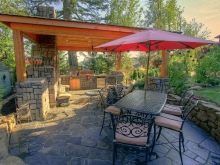
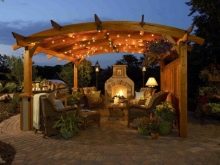
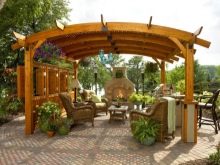
Forms
Rectangular gazebos are recommended to be created on an area with strictly consistent geometry. This configuration increases the efficiency of space utilization and allows you to invite many guests, all of whom will feel real comfort. Round pavilions even have a special name - arbors, they differ mainly in their small size.
Obviously, for small areas, such a solution would be an ideal choice.
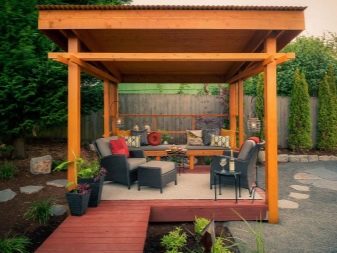
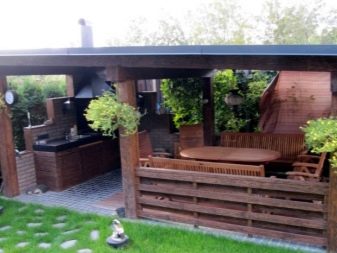
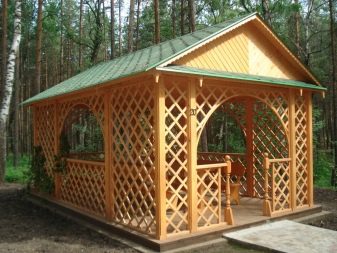
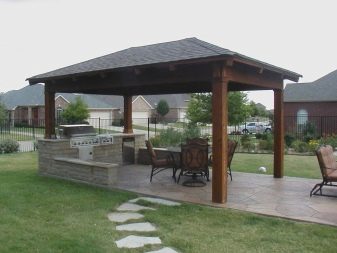
Original designs can serve as a good alternative to the two most common forms. Among the atypical design options, in most cases, octagonal arbors are chosen. Regardless of the specific configuration, it is recommended to make unusual buildings with your own hands. With the help of completely ready-made blocks, you will be able to implement your plan as accurately and deeply as possible, as well as avoid mistakes.
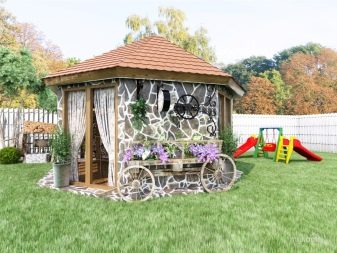

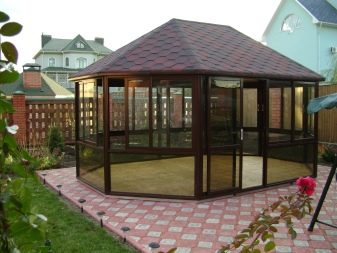
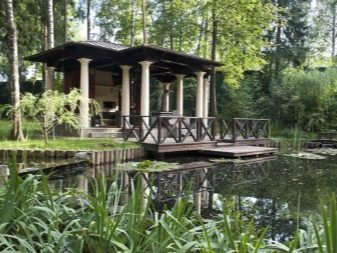
Projects
Drafting a gazebo begins with choosing a territory for it.
The building does not have to be in the garden, but in any case it is required:
- place the gazebo where the noise will not cause inconvenience;
- choose a place where the soil is relatively dry;
- make sure that the appearance of the building is pleasant and elegant.
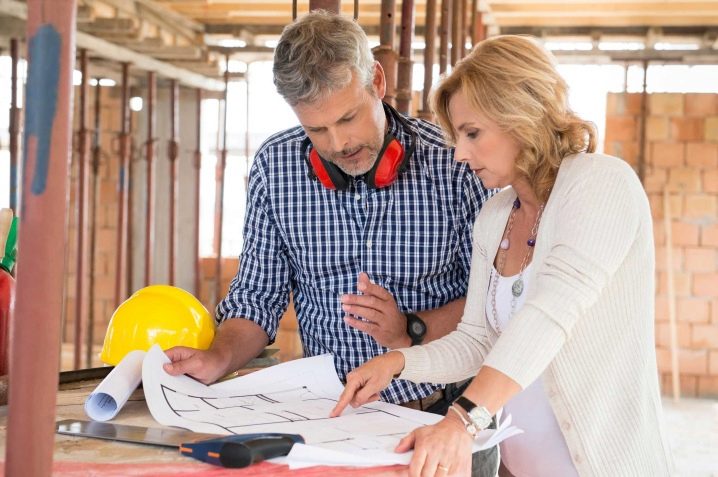
Then the dimensions of the structure are selected - length, width and height. Depending on the characteristics of the place and geometric shape, climatic conditions and the upcoming use of the gazebo, the appropriate material is chosen for it.
Both small and large gazebos should be designed with a mandatory sketch. The figure reflects the configuration of the structure, the arrangement of the main parts, the design concept and decoration elements. In accordance with the sketch, a drawing is prepared, which indicates the type of foundation, the number of supports and the type of parapets, the rafter system.
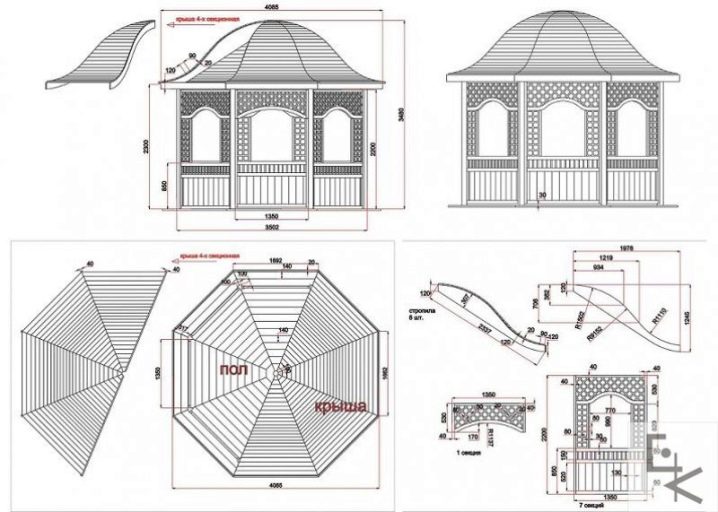
Already on preliminary drawings, the values are supposed to be set final, on a real scale. The markup on the working drawing is made as detailed as possible, this is carefully monitored so as not to get confused later.The diagrams of the most complex details (points of attachment of the rafter leg, the connection between the trim and the support pillars, the intersection of the pipe and the plane of the roof) are performed additionally.
Unlike the veranda, the gazebo is always separated from the main part of the house, and is not inseparably connected to it. Awnings and bumpers are characteristic elements for any type of verandah.
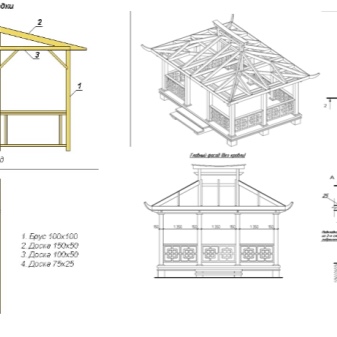
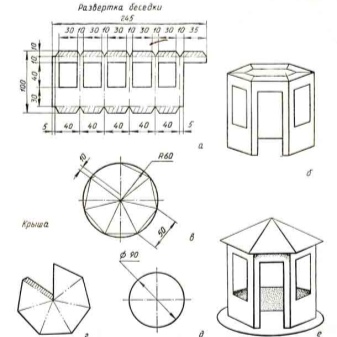
You can show your stylistic preferences and tastes using a number of techniques:
- glazing;
- completions;
- adding decorative designs;
- cladding with wood or special panels;
- covering the walls with polycarbonate sheets.
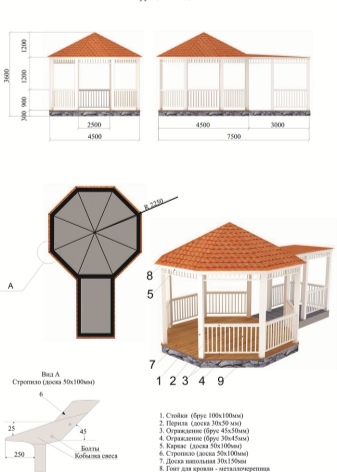
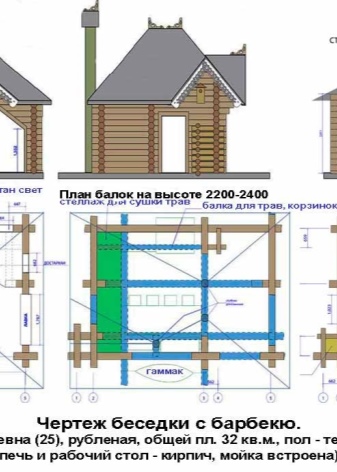
When redoing a finished project, it is undesirable to change the geometric shape of the gazebo or drastically reduce (increase) the size. As practice shows, this only leads to the appearance of additional problems and difficulties, which cannot be predicted in advance. The conclusion is simple: before starting the design, you should immediately decide whether the building will be designed for 6 people or for 10 people, this is a very different area and design.
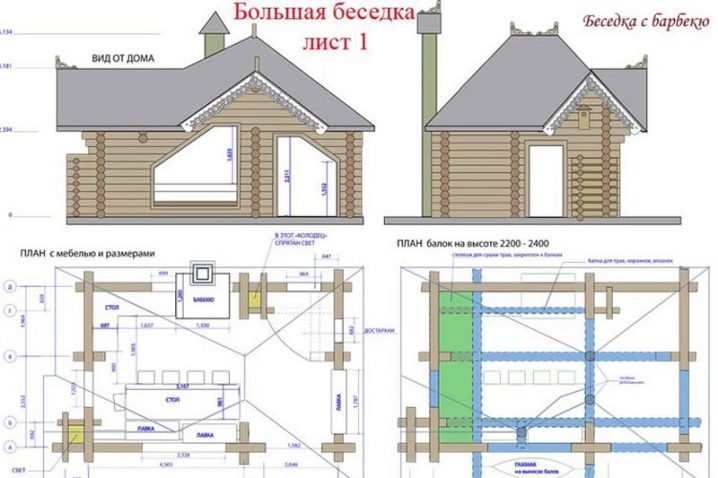
Even the smallest available territory makes it possible to equip the site at a high level by combining different premises. One of the best combinations is a gazebo with a utility block.
The advantages of this step are the following nuances:
- the possibility of arranging a toilet directly in the economic zone without losing external attractiveness;
- the ability to make shower cabins in summer design;
- saving money (more money can be spent on the construction of the main house);
- thanks to the outbuilding, it is possible to supply the grill with dry fuel even in cloudy weather.
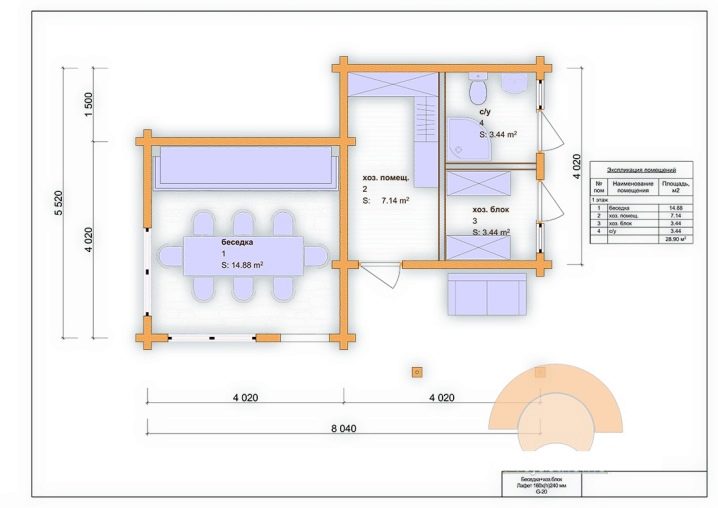
Outbuildings are most often located on the north side in order to increase protection from a gust of wind, to make being in the gazebo more comfortable and pleasant in any season. To build a gazebo with a utility block with a total size of 3x7 sq. m you will need 18 foundation blocks and a 3.8 cm thick floorboard (pine). For the frame, a timber with a section of 10x10 cm is taken, the roof is mostly made of ondulin (gable type), in order to sheathe the frame it is recommended to use lining, additional decor is most often represented by a wooden crate.
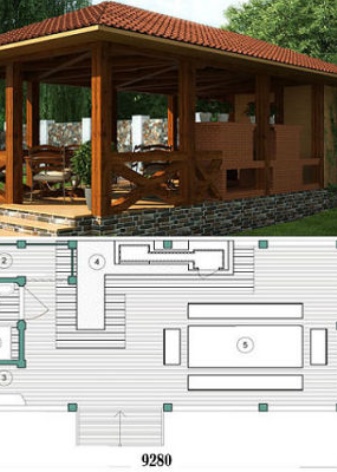
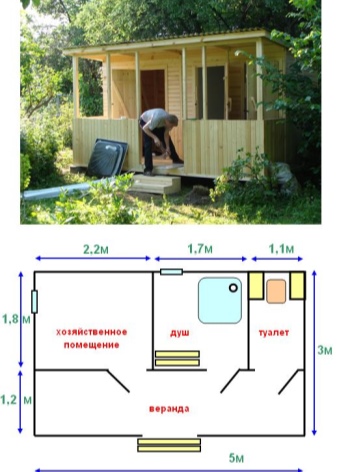
Projects of combined gazebos, with all their diversity, belong only to one of the groups: either detached from the main building, or attached to it. It is the second type that is considered the most difficult for designers and builders, because many subtleties and nuances must be taken into account. It is very important to take into account the percentage of shrinkage, to avoid the location of the roof of the main house on the same level with the roof of the outbuildings (the slope of the latter should be exactly 30 degrees). For the formation of the main part of the gazebo and the utility block, the same materials are always preferred with it, if their properties differ, the risk of destruction is very high.
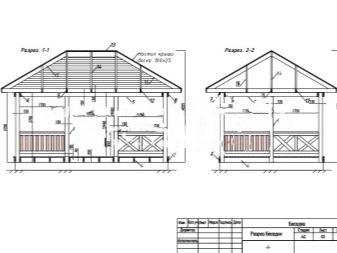
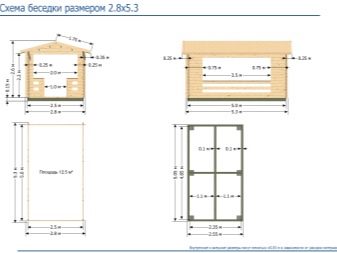
Design and style
You can choose any of the following styles to create a gazebo.
- Summer gazebos classic style are both quadrangular and multi-sided, there is no need to decorate them especially. As a result, such a solution is also economical and easy to implement.
- Oriental decoration allows you to demonstrate exotic motives, most often they are expressed in imitation of pagodas and multi-tiered roofs. Optimal materials for oriental style are a combination of metal and wood.
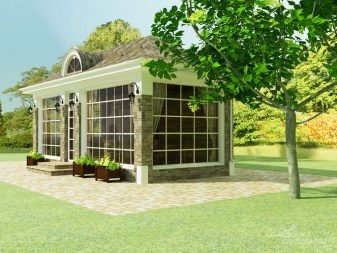
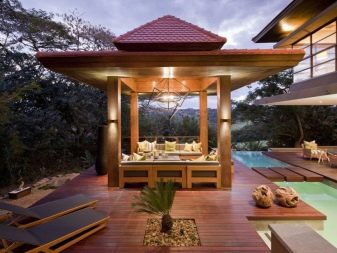
- Forest style means that the owners decided to decorate the gazebo in the spirit of a real thicket of the forest, plunging into wildlife every time. It is not necessary, however, to create exactly green living walls; the most ordinary processed wood also allows you to embody the idea. If only she was well chosen. It is good to use ivy and other climbing plants to decorate the building; partially sawn trees are used as pillars, giving special grace and romance.
- Rustic style you can use a variety of ideas, but in any case, the use of wood is required. Having abandoned the processing of logs, folding them like a toy house, you can arrange the structure in accordance with folklore and traditional motives. If you use a classic oven, you can replace the brazier with it. An important point: processing of the log is required to a perfectly flat and smooth surface.
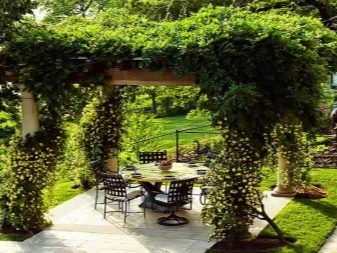
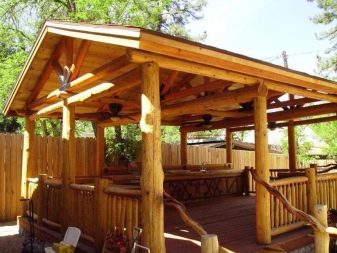
To make the right decision, it is recommended to immediately determine the purpose of use and the location of the gazebo. If you have to often receive guests, you need to put the building closer to the walls of the house, but not close to it. This will allow everyone who leaves a friendly company to rest quietly for a while.
- Simple Styles - these are, first of all, Russian motives. Log buildings reproduce a rural hut of the old times, carved structures imitate the spirit of a merchant's estate. The thread can be both through and surface. It is desirable to decorate the interior with traditional household items. Choosing a structure that imitates an emphatically heavy log house, developers will not be mistaken, this is the most classic option.
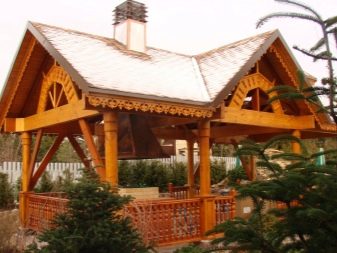
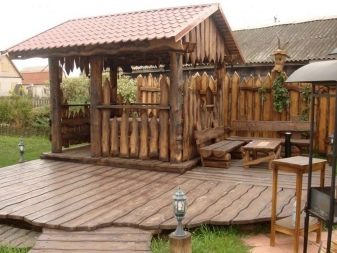
But it is not necessary to reproduce the atmosphere like a peasant hut or a boyar's chorus: light carved houses, referring the viewer to the buildings of the 18th century, are also a full-fledged part of the Russian architectural tradition. Wooden lace looks exquisite, even luxurious, and finally completes the folding image. You can also use one or several old Russian details, creating an eclectic gazebo in a free manner.
The rustic format is quite close to the Russian one, the difference is that the wood is processed deliberately "carelessly". In some cases, the surface is brushed, it is embossed.
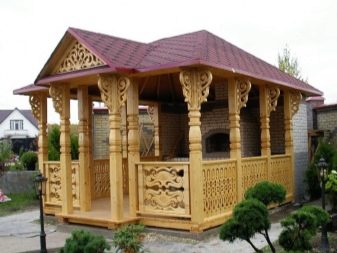
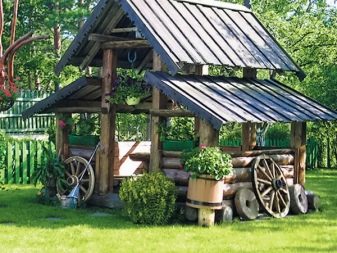
Interesting solutions in the rustic style are the simplest furniture and the use of coarse linen in textiles.
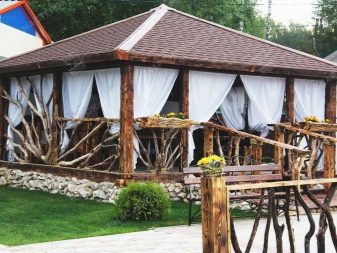
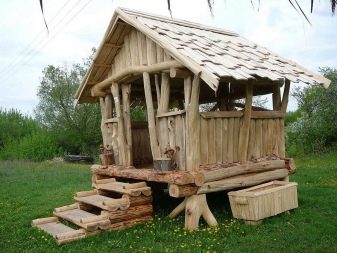
- Finnish variety gazebos certainly have three features:
- Closed type.
- The use of glass.
- Thorough insulation.
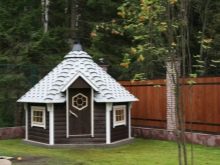
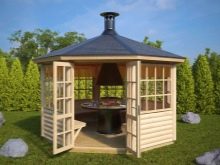
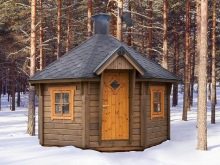
In most cases, it is round, only occasionally a square and rectangular configuration is used. The fire burns mainly in the center of the room; dim colors outside and natural wood in the interior are used to decorate the gazebos. The main decorative elements are curtains and pillows in catchy colors. All modern Scandinavian gazebos look about the same as in the minimalist style, that is, it is very simple, it is not recommended to use more than three colors.
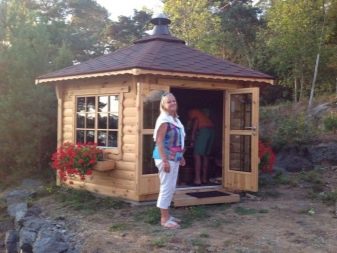
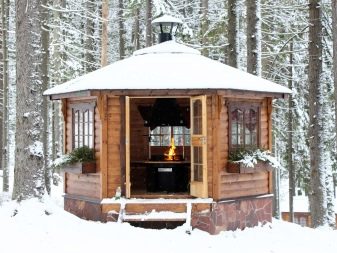
- Provencal style works best with the use of white paint in all its possible forms. It is very good to use other colors as well, but they should all be quite pale, as if with a dusty effect. Textile decor is supposed to be taken exclusively with small patterns, preferably floral motifs.
If furniture is placed in the gazebo, then only the one that looks light and airy.
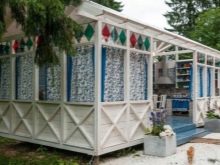
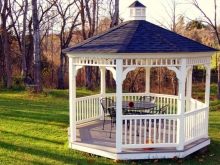
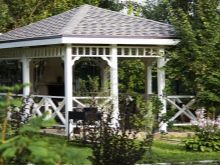
- Japanese gazebos can be found every year more and more; a semblance of a miniature Buddhist pagoda is to the taste of a very large number of people. This is quite understandable, because the structure is relatively simple, erected without assistance and requires only minimal costs. The main construction materials in the original version are bamboo, reed raw materials and straw in combination with oil-impregnated rice paper. But in the conditions of the Russian climate, such a solution turns out to be too impractical, therefore, mainly wood and stone are used.
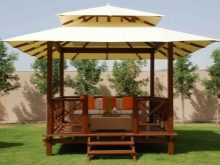
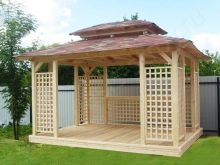
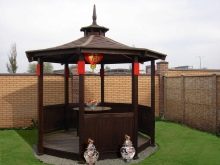
Any inclusions of plastics and other synthesized materials are strictly unacceptable. The Japanese version of the gazebo also implies a strict orientation to the cardinal points.Blank walls are located in the south, the entrance is equipped either from the west or from the east, in order to simultaneously make the structure cool at any time and enjoy the rising and setting sun. A house in this style is preferred to be placed on hills, because it should be clearly visible from all sides of the site.
Surrounding the gazebo with fruit trees is a good idea.
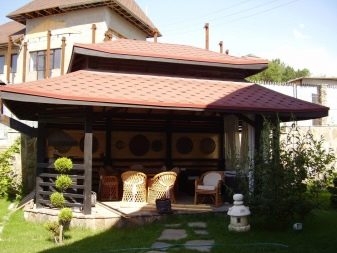
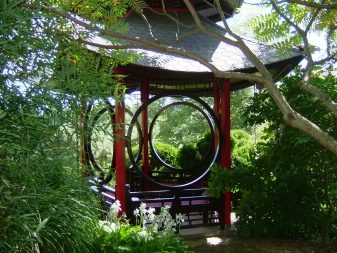
A pond nearby will allow you to relax, and to make the structure seem weightless, you should put it on piles. It is categorically impossible to resort to flashy colors and variegated elements.
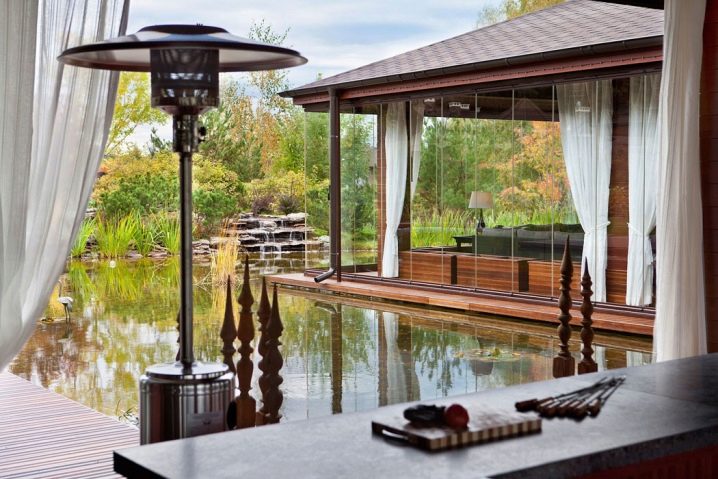
- Chalet style noticeably different, it is simply impossible to confuse two approaches that are so different in spirit. The roof of such gazebos is always wide, the foundation is stone, very strong. Even where blizzards and snow drifts are familiar, such a solution manifests itself at its best. The roof is covered with metal or flexible materials. It is worth resorting to natural clay tiles only when the foundation is strong enough, otherwise the structure may not be able to withstand the generated load.
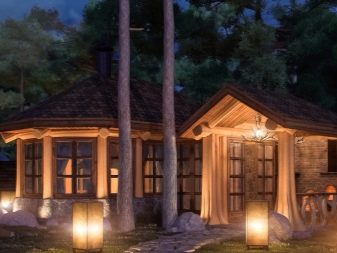
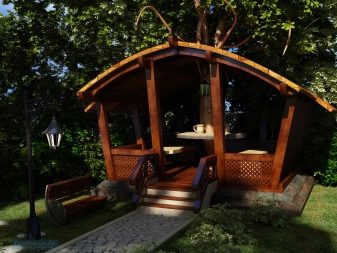
Beautiful examples
- There are many options for beautiful gazebos, but among the leaders, undoubtedly, there is a combination of an elegant white roof with a brick base. Glazed walls, through which the dining group is perfectly visible, only add to the impression. As well as the sidewalk around the building, made a couple of shades darker than it and in very elegant colors.
- An open gazebo with elegant geometric pillars and stonework on one of the walls turns out to be quite an attractive solution. Using a fireplace to decorate the decor only adds a romantic touch to the atmosphere, and helps to complete the formation of a holistic composition.
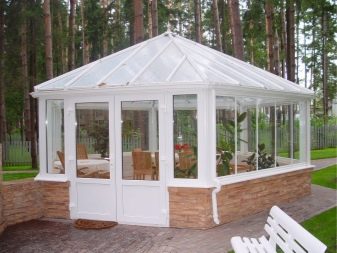
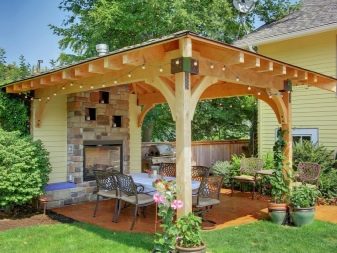
How to make a gazebo with your own hands, see the video below.




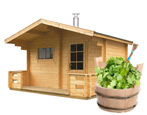
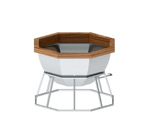
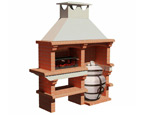
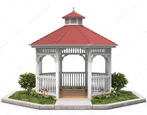

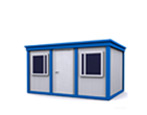
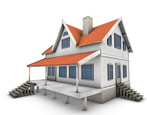
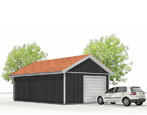
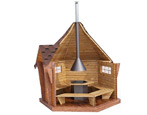
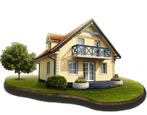
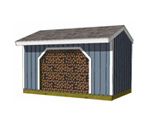
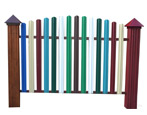
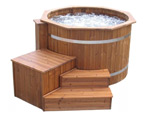
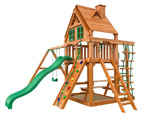
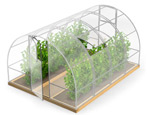
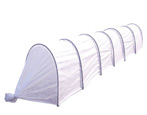
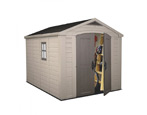
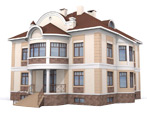







































The comment was sent successfully.